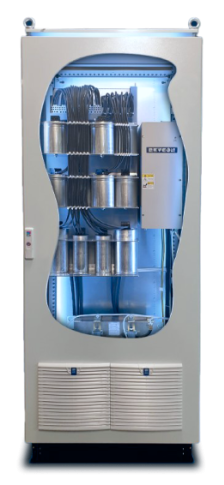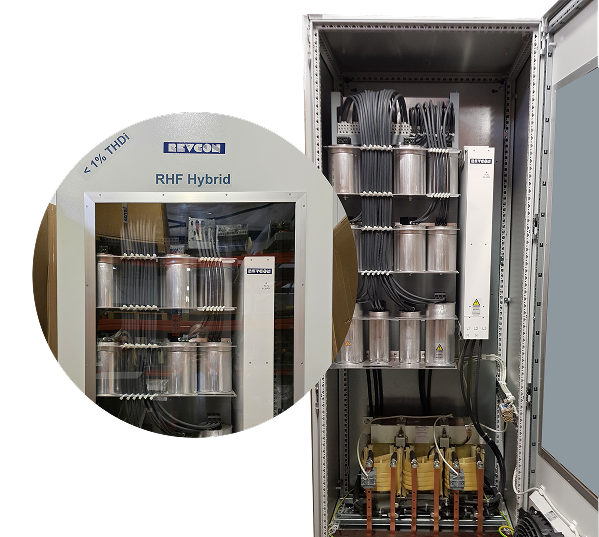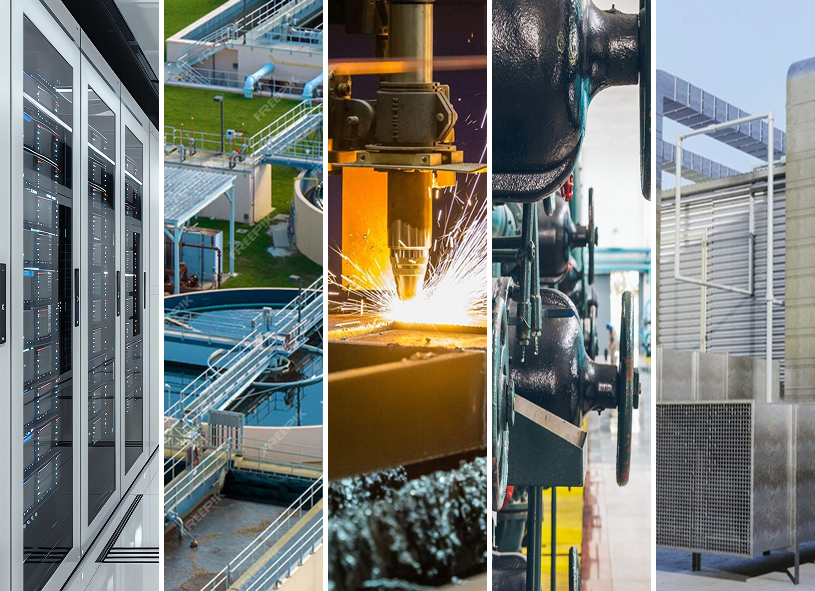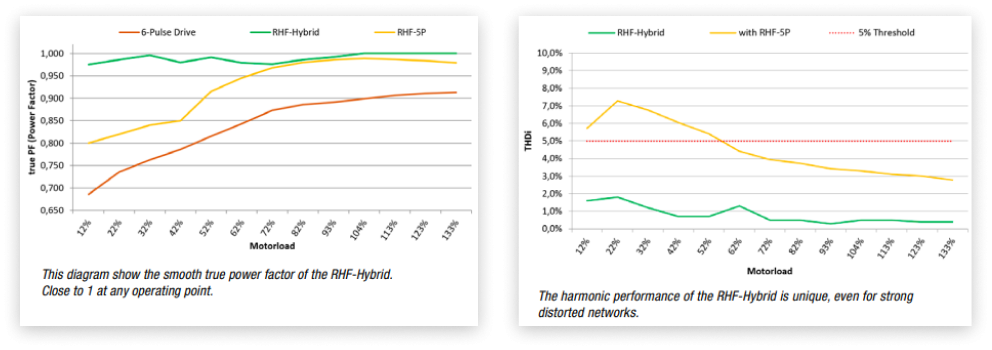RHF-Hybrid Harmonic Filter
Advanced Hybrid Solution for Power Quality
Applications of RHF-Hybrid Filters:
Buildings
Data Center
Water Treatment
Oil & Gas
General Industry

How Hybrid Harmonic Filters Work
The Power of Hybrid Technology
A hybrid harmonic filter is a combination of passive and active harmonic filters. The passive part of the circuit eliminates the majority of harmonic distortion, much like the RHF-8P. The active harmonic filter handles the further fine-tuning of harmonic performance. What makes hybrid harmonic filters special is the ability to eliminate reactive power when there is low harmonic current during part load, which is accomplished mainly by using the active filter.

Key Benefits of RHF-Hybrid Harmonic Filters
Some key benefits of hybrid harmonic filters include:
Enhanced Harmonic Mitigation
The presence of high distortion in the voltage supply can damage your equipment. Hybrid harmonic filters mitigate these distortions even in the toughest environments, thus ensuring comprehensive harmonic control across widely different load conditions. In fact, they are so effective that they can reduce the total harmonic distortion (THD) to less than one percent.
Efficient Reactive Power Management
The prevalent issue with passive filters is the presence of reactive power. While reactive power can aid in stability, it is a suboptimal use of energy since the machines cannot use this power. Hybrid harmonic filters eliminate this reactive power altogether and help maintain a power factor of almost 1, which makes the electrical system as efficient as possible.
Cost-Effective Design for Maximum Value
The active filter component that is responsible for switching the two passive filter circuits is significantly smaller in a hybrid harmonic filter. Its size is only 10 percent of the RHF-Hybrid rating. This allows hybrid harmonic filters to deliver superior performance while being highly cost-effective when compared to active filters.

Why Choose RHF-Hybrid Harmonic Filters?
Adaptive Performance Across Load Conditions
The main benefit of hybrid harmonic filters is their ability to adapt to incoming non-linear loads. If the distortion is too high, the active filters help switch to a passive circuit which handles most of the distortion. If the task is fine-tuning the input current, then active filters within the system are adequate for handling it. The result is a smooth and optimized power quality management, irrespective of load conditions.
Economical Solution for Power Quality Improvement
Active harmonic filters are the best when it comes to high-impact solutions. However, they are also quite expensive, necessitating their use only in the most extreme conditions. A hybrid harmonic filter can also match the efficiency of an active filter in many cases, but only at a fraction of the cost. Therefore, in applications where extreme performance is not necessary, hybrid harmonic filters strike a perfect balance between versatility and cost-effectiveness.

Typical Use Cases for Hybrid Harmonic Filters
Where to Use RHF-Hybrid Filters?
Data Centers:
They require a reliable, steady power supply with no room for downtime. Hybrid harmonic filters are an ideal solution in this case.
Oil & Gas Facilities:
Apart from needing steady power, this sector also needs clean energy to ensure optimal performance.
Water Treatment Plants:
Quality power supply in wastewater management facilities ensures proper performance of filtration equipment and compliance with local regulations.
Industrial Operations:
Industrial operations use a variety of sensitive equipment such as conveyor systems and CNC machines. A clean and stable power supply via hybrid harmonic filters helps reduce any downtime and protect this equipment from damage.
Large Chillers:
These use variable frequency drives or inverters, which can generate a lot of harmonic currents, leading to grid disruption, overheating, equipment damage and increased energy consumption. A hybrid harmonic filter helps eliminate all these problems in one go.

Performance Metrics of the RHF-Hybrid
Maintaining Optimal Power Factor
A filter’s efficiency can be judged by its power factor. In the case of hybrid harmonic filters, it achieves a power factor of almost 1 at any load. This directly translates to optimal energy consumption by any equipment connected to the filter. Apart from efficient usage, it also protects the equipment from harmful distortions that can reduce its lifespan.
Unique Harmonic Performance Even in Challenging Networks
Hybrid harmonic filters guarantee reliable filtering, even for strongly distorted networks. This means they can guarantee smooth and consistent power quality management irrespective of the application, be it light or intensive.
Get Started with RHF-Hybrid Harmonic Filters
Want to know how our RHF-hybrid harmonic filters can help optimize your operations? Contact us today at 877-236-8337 for more product information, including test reports and specifications. Looking for custom solutions? ADM Engineering Inc. can help choose the perfect hybrid harmonic filter for your unique needs.
We are currently working on bringing you the full version of our site. Some of the functionalities may be limited at this time.
If you have any questions about the services we offer don’t hesitate call us at +1 (877) 236-8337.




